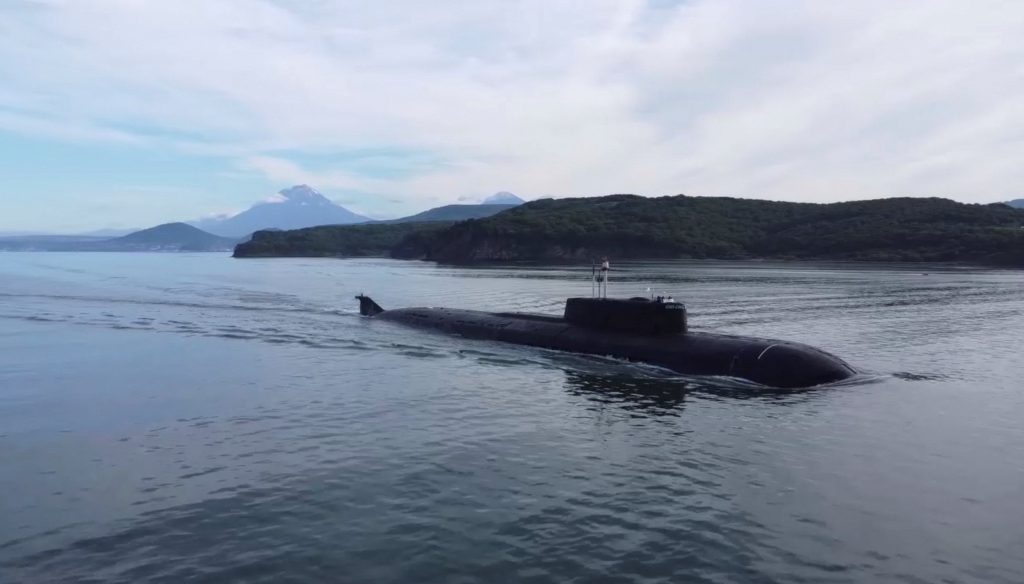
A still image from video, released by the Russian Defense Ministry, shows what it said to be a Russian nuclear-powered submarine sailing during the military drills Umka-2022 in the Chukchi Sea, in this still image taken from handout footage released Sept. 16, 2022. (CNS photo/Russian Defense Ministry via Reuters) MANDATORY CREDIT.
This afternoon the Archdiocese of Seattle along with the Archdiocese of Santa Fe issued a joint news release. The release also carries a joint letter from my self along with Archbishop Wester of Santa Fe and the Bishops of Hiroshima and Nagasaki urging the G7 leaders to take action for peace and nuclear disarmament. The G7 Summit will be held in Hiroshima and begins this weekend (Friday, May 19 – Sunday, May 21).
I ask for your prayers, particularly aligned with our request to the G7 Leaders to concretely work towards nuclear disarmament.
Archbishop Paul D. Etienne Issues Joint Letter with Archbishop of Santa Fe and the Bishops of Hiroshima and Nagasaki Urging G7 Leaders to Take Steps Toward Nuclear Disarmament
SEATTLE, May 16, 2023 – Archbishop Paul D. Etienne along with Archbishop John C. Wester of Santa Fe, New Mexico, Archbishop Peter Michiaki Nakamura of Nagasaki, Japan and Bishop Alexis Mitsuru Shirahama, of Hiroshima, Japan, issued a joint letter to the G7 leaders urging for immediate action to prevent further proliferation of nuclear arms. Together they request peace and disarmament – a sentiment echoed by millions around the world. Their appeal to the G7 leaders carries the weight of moral responsibility and represents a unified call for concrete steps towards a safe and more secure world for everyone. Please see a copy of the letter below:
May 15, 2023
Dear G7 Leaders,
We, the undersigned spiritual leaders of the Roman Catholic Church, urge you to use the upcoming summit of the International Group of Seven to undertake concrete steps toward global, verifiable nuclear disarmament.
We commend Prime Minister Fumio Kishida for choosing the City of Hiroshima, the first victim of nuclear war, as the summit venue. That alone is a powerful message. We enthusiastically welcome the meeting between G7 leaders and the hibakusha – the survivors of the atomic bombings of Hiroshima and Nagasaki – as a step toward recognizing the long-lasting horrors of nuclear warfare.
As the Roman Catholic spiritual leaders of the diocese with the most spending on nuclear weapons in the United States (Santa Fe, NM), the diocese with the most deployed strategic nuclear weapons in the United States (Seattle, WA), and the only two dioceses in the world to have suffered atomic attacks (Hiroshima and Nagasaki, Japan), we are compelled by providence to speak out.
As Prime Minister Kishida observed, the summit presents a unique opportunity “to deepen discussions so that we can release a strong message toward realizing a world free of nuclear weapons” and to “demonstrate a firm commitment to absolutely reject the threat or use of nuclear weapons.”
We strongly agree. We, therefore, urge you to use the summit to center international attention on the importance of nuclear arms control and disarmament and demonstrate a global commitment to nonproliferation efforts. Rather than viewing the war in Ukraine as an overwhelming impediment toward making substantial progress, we view it instead as a clear demonstration of the absolute need to do so.
Specifically, we encourage G7 leaders to:
- acknowledge the tremendous, long-lasting human suffering the Hiroshima and Nagasaki atomic bombings inflicted upon the hibakusha; acknowledge the tremendous, long-lasting human suffering that production and nuclear weapons testing caused to downwinders around the world;
- reiterate a nuclear war cannot be won and must never be fought, as well as emphasize that, as the G-20 agreed to in November 2022, the use and the threat of use of nuclear weapons are “inadmissible”;
- reaffirm the goal of a future world free of nuclear weapons;
- announce and commit to concrete steps to prevent a new arms race, guard against nuclear weapons use, and advance nuclear disarmament;
- reiterate that serious talks should be restored between the United States and Russia to renew full implementation of the New Strategic Arms Reduction Treaty and to negotiate a follow-on treaty; and finally,
- honor the international mandate to enter into serious multilateral negotiations leading to nuclear disarmament, pledged more than a half-century ago in the 1970 Non Proliferation Treaty.
Throughout the years, world leaders have spoken about the need to eliminate the threat of nuclear weapons, prevent a new nuclear arms race, and avoid the ultimate catastrophe that is potentially civilization-ending nuclear war. These calls have long been echoed by many notable world leaders, such as Mikhail Gorbachev, Ronald Reagan, and Pope Francis. But it is now time to translate rhetoric into action.
We believe today’s new nuclear arms race is more dangerous than the first arms race, given multiple nuclear actors and the advent of new cyber and hypersonic weapons and artificial intelligence. Former U.S. Defense Secretary Robert McNamara asserted that humanity survived the Cuban Missile Crisis only by luck. Luck is not sufficient to ensure the continuing survival of the human race.
We strongly urge world leaders at the G7 Summit to show by example how international leadership is ready, willing, and able to work with nuclear weapons and non-nuclear weapons states to ensure no country or city ever suffers the horrors of nuclear war again.
Yours in the hopes of humanity for lasting peace on earth,
Most Reverend John C. Wester Most Reverend Paul Etienne
Archbishop of Santa Fe, NM Archbishop of Seattle, WA
Most Reverend Peter Michiaki Nakamura Most Reverend Alexis Mitsuru Shirahama
Archbishop of Nagasaki, Japan Bishop of Hiroshima, Japan
End of Letter
With the looming threat of nuclear conflict, the bishops advocate for a comprehensive approach that includes transparency, dialogue, and cooperation among nations. Their plea highlights the moral imperative of prioritizing human security, fostering trust-building measures, and investing in peaceful alternatives.
Helen McClenahan, Archdiocese of Seattle
helen.mcclenahan@seattlearch.org | 206-375-5679
Leslie Radigan, Archdiocese of Santa Fe
lradigan@archdiosf.org | 505-831-8180
3